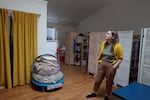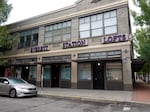
Kimberly Kimble stands in front of three makeshift bedrooms, sectioned off by room dividers, in her family's studio apartment in Portland, Ore., on Sept. 26, 2024. Kimble was told she was moving into a three-bedroom apartment when she signed the lease in 2021.
Alex Zielinski / OPB
Three years ago, Kimberly Kimble was panicking.
It was August 2021, and Kimble’s landlord announced a rent hike just as Oregon’s rules that prevented landlords from raising rents during the pandemic were expiring. Kimble, a self-employed photographer, knew she couldn’t afford the increase at the Sherwood apartment she shared with her spouse and three children, ages ranging from 7-16.
When she saw the ad for an affordable three-bedroom apartment at an “artist community” in downtown Portland, she didn’t hesitate to apply. And when she got a brief tour of the old brick building, the Everett Station Lofts, she didn’t question why the property manager wasn’t able to show her inside the apartment.
“It seemed like a great opportunity,” Kimble said. “Too good to be true, I guess.”
It wasn’t until Kimble signed a lease and received keys to her family’s new home that she realized she’d been misled. The 1,400-square-foot unit had no bedrooms — it was simply a large studio apartment.
Yet this didn’t stop Kimble’s landlord from charging her rent for a three-bedroom apartment.
Only recently did Kimble learn that her nearly $2,000 monthly rent — which made it hard for her low-income household to save money for another move — was far higher than what’s required under federal affordable housing regulations for her family’s studio.
Related: Affordable housing a primary concern for Oregon’s college students
It’s enough to prompt legal action. The Everett Station Lofts owners are now facing a class action lawsuit from their low-income tenants, who are accusing them of bending affordable housing rules for their own financial gain. The building owners declined to comment on the litigation.
The owners are the focus of the legal case, but the dilemma shines an additional spotlight on the agency expected to hold affordable housing providers to account: the city of Portland. It took more than two decades for the city’s affordable housing compliance team to realize Everett Station owners may be violating its agreement with the city and overcharging tenants.
As the city rolls out an ambitious plan to build tens of thousands of new affordable housing units over the next 20 years, housing experts question whether it’s capable of keeping developers in check.
Tenants like Kimble wonder who else has already been harmed.
“If this is happening to us,” she said, “who’s to say other renters are being overcharged just because the city hasn’t held landlords accountable?”
An unusual agreement
Most affordable housing complexes in Portland are enrolled in programs operated by the city or state with clear, established guidelines and incentives. For example, the city’s Inclusionary Housing program waives property taxes and fees on new apartments if the property owners keep a percentage of units affordable to low-income renters. And the federal Low-Income Housing Tax Credit gives developers tax credits in exchange for building affordable rentals.
Under these programs, affordability is calculated by looking at the median income earned by people living in a metropolitan area, and then keeping rents affordable to people making 60-80% of those incomes. In some cases, rent is capped even lower under these programs.

The exterior of the Everett Station Lofts in Portland's Old Town Chinatown Neighborhood, where low-income tenants are suing the building's owner for inflating rents.
Alex Zielinski / OPB
Everett Station Lofts is unique — and harder to track — because its affordable housing requirements don’t fall into any of these well-established programs. In 1998, the city inked a standalone deal to give the 47-unit apartment’s Minneapolis-based developer public funding “loaned at terms more favorable” than private loans. In exchange, the owners pledged to keep five units in the building affordable for renters making 60% of the area’s median income and 25 units regulated at 80% median income for 30 years. The remaining 17 units could be rented at market rate.
A city document shows the lofts received just under $500,000 in city development loans.
At the time, the owners agreed to follow federal housing standards, which based the area median rent off the number of bedrooms in an apartment. Because all the units are studio lofts, without any bedrooms, they were priced as one-bedroom units.
But this policy changed quietly in 2003. According to the Portland Housing Bureau, that’s when a faxed document was added to the city’s file on Everett Station Lofts.
“The originator of this fax is unclear,” wrote Gena Scott, a compliance manager at the housing bureau, in a letter sent to the apartment owners earlier this year. The document outlined a plan to start charging tenants based on their apartments’ square footage rather than the number of bedrooms, which would boost most Everett Station units to three-bedroom rents.
Related: Portland program that requires developers build affordable housing is falling short, audit finds
Scott said there was no evidence that the city signed off on this new rental agreement. But that didn’t keep the property owners from moving ahead with the new plan.
The lofts have changed hands several times since the initial agreement, bouncing between different similarly-named LLCs. The current listed owner — the unambiguously named Everett Station Lofts Owner, LLC — is managed by Rick Slagle of TGR Development, a firm based in Colorado and Minnesota that focuses on affordable housing and residences that support artists.
Slagle declined to speak with OPB about the unusual rental calculations, noting that he doesn’t comment on active litigation.
Miranda Krone, another tenant at Everett Station Lofts, first realized she was being charged for a three-bedroom when she considered moving units last summer after her adult daughter moved out of her apartment. She lives in one of the one-bedroom apartments capped for tenants making at least 80% of the area’s median income (which is $66,000 for a solo renter in the Portland metro area).
Under this criteria, she should have been paying about $1,580 monthly. She had been paying $2,125 since moving in earlier that year.
“I asked the landlord why I was being charged for a three-bedroom, especially since it went against the [federal affordable housing] standards,” Krone said. “I was like, ‘This is kind of weird, right?’ They told to get me to get a lawyer.”
Taking action
Krone is the lead plaintiff in the class action lawsuit against Everett Station Lofts Owners, LLC.
The case accuses the owners of violating its agreement with the city and overcharging low-income renters. The lawsuit claims that “the overcharging potentially generated millions of dollars in unfair profits, impacting dozens of tenants over the past ten years.”
The plaintiffs are asking for a trial.
Related: Portland-area church property offers new affordable housing for LGBTQ+ seniors
Krone, a chef who has been living off worker’s compensation benefits after an injury at work, said she’s watched many of her neighbors move out due to the high prices. She wonders how long the owners would have continued to charge tenants for three-bedroom units if she hadn’t raised concerns last year.
“I’m at home with time to sit here and research and make phone calls and send emails,” she said in a recent interview. “But not many tenants have that kind of time. That’s how the owners take advantage of us.”
Krone believes it should have been Portland’s responsibility — not hers — to enforce the original rental agreement, and protect renters like her.
“The owners took public dollars and promised the city to keep the rent at a certain rate and they haven’t done that,” Krone said. “At what point does the city hold them accountable?”

Miranda Krone and her cat Frankie sit in her apartment at the Everett Station Lofts in Portland, Ore., on Sept. 26, 2024. Krone is the lead plaintiff in a class action lawsuit against the complex's owners.
Alex Zielinski / OPB
The Portland Housing Bureau has a team of six dedicated to monitoring and enforcing affordable housing agreements with property owners. But, because the original Everett Station Lofts agreement was, unusually, made with the city’s economic development bureau, the housing bureau was late to learn of the program — and the unorthodox rental rates.
“This is a complex situation…over a 26 year-old, non-standard regulatory agreement,” wrote housing bureau spokesperson Gabriel Mathews in an email to OPB. “Our [compliance] team has been working to address this situation since it was brought to their attention.”
No other housing project regulated by the city calculates rent based on square footage, according to the bureau’s records.
Mathews told OPB that the Housing Bureau’s compliance team has been overworked and understaffed in recent years, as the number of city-regulated housing programs has skyrocketed.
This problem has been reflected in recent reports by the City Auditor’s Office. In May, an audit found that the city was two years behind reviewing compliance reports sent by property managers.
Meanwhile, the city is working to build more housing that gives affordable housing developers tax incentives to meet Gov. Tina Kotek’s housing production goals for cities across Oregon.
In August, Portland City Council passed an ambitious plan to build more than 60,000 new units of affordable housing by 2045. That plan acknowledged that the city has struggled to keep affordable housing developers in compliance, but did not introduce any solutions to address further problems.
Colleen Carroll is a research assistant at Portland State University’s urban studies program, where she focuses on eviction data and affordable housing programs. She echoed Krone’s concerns.
“I think that there’s a lot of emphasis on building owners in these programs,” she said. “There’s lots of reassurance about profits and control over tenants. But there’s almost never any consideration for tenants.”
Under pressure
Krone first contacted the Housing Bureau about her rent in August 2023, before considering a lawsuit.
In July, the Housing Bureau sent a letter to Everett Station Lofts owner Slagle, explaining that measuring rent costs by square footage, rather than bedroom court, violated the 1998 agreement with the city.
“Effective immediately, tenant rents must align with the rent limits established by [the US Department of Housing and Urban Development],” Scott wrote. She explained that monthly rent for the affordable one-bedroom apartments couldn’t be higher than $1,770.
Months later, Krone, Kimble, and other tenants in affordable units have yet to see their rents change.
Portland attorney Michael Fuller is representing Krone and her neighbors in this case. He said that city letter is clear evidence that the apartment owner is violating the agreement.
Unlike his client, Fuller doesn’t cast blame on the city for potentially mismanaging the agreement.
“I have never put much stock in government protections for consumers,” he said. “They’re overworked and under-resourced, I don’t think it’s up to them to spend taxpayer dollars on regulating fraud.”

Kimberly Kimble stands in her studio apartment in the Everett Station Lofts, which she shares with her partner and three children, on Sept. 26, 2024. Kimble said she has worked hard to make the cramped space cozy and livable for her family.
Alex Zielinski / OPB
He said he believes the class action suit is the best way to address the alleged financial injustices the Everett Station Lofts tenants have endured.
That remedy couldn’t come soon enough.
Kimble, the mother of three, has worked hard to make her cramped studio space livable, erecting room dividers to give her kids a sense of privacy. But the snug layout has strained her marriage and led to hard conversations with her kids about why they “can’t have bedrooms like their friends.”
She and her partner have considered moving into another apartment complex with regulated affordable rents, but their experience with Everett Station has left them distrustful of any similar programs. Kimble said she still feels as “hopeless” as she did when she first rushed her family into the studio apartment.
It doesn’t help that she received notice that her rent is increasing by at least $60 in January.
“I moved here in an impossible situation,” she said, “and three years later, it’s still an impossible situation.”
Correction: This story has been updated to correctly reflect the findings of a May 2024 city audit.

